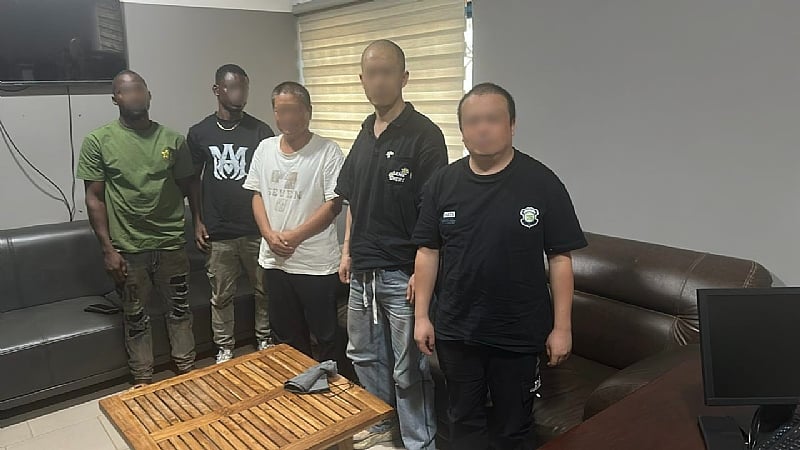The serene landscape of Assin Ayiteykrom, nestled near Akonfudi in Ghana’s Central Region, became the stage for a dramatic confrontation between law enforcement and illegal miners. A dawn operation, spearheaded by the Central North Police Command’s Anti-Galamsey Special Taskforce, resulted in the arrest of five individuals: two Ghanaians and three Chinese nationals. These individuals, identified as Kwabena Sakakba, Douglas Nyamekye, Ma Jian, Ma Young, and Ma Haibi, stand accused of engaging in illicit mining activities along the River Fum, a vital lifeline for dozens of communities in the area. The operation also yielded the seizure of two excavators, the primary tools used in this destructive practice, and a Toyota Hilux vehicle, likely used for logistical support. This incident underscores the ongoing struggle against illegal mining, locally known as “galamsey,” which continues to plague Ghana despite repeated efforts by authorities to curb it.
The River Fum, the focal point of this illegal activity, serves as a crucial water source for 88 surrounding communities. Its importance extends beyond mere hydration; the river is essential for the livelihood of countless cocoa and vegetable farmers who rely on its waters for irrigation and other agricultural practices. It represents a lifeline for these communities, providing not only drinking water for those working in the fields but also sustaining the agricultural production crucial to their economic survival. The illegal mining operations, however, pose a severe threat to this vital resource, polluting the river and jeopardizing the health and economic well-being of the communities that depend on it. The contamination caused by illegal mining can have far-reaching consequences, impacting both human health and the ecological balance of the river system.
The arrests made in this operation are a testament to the dedication of law enforcement agencies in combating illegal mining. The swift action taken by the Anti-Galamsey Special Taskforce, acting on a tip-off from concerned citizens, underscores the importance of community involvement in tackling this environmental and societal menace. Assistant Superintendent of Police (ASP) Francis Onyina, speaking on behalf of the Central North Public Affairs Directorate, confirmed the arrests and the ongoing investigation. The seized excavators, potent symbols of the destructive nature of illegal mining, will be transferred to a secure facility while authorities endeavour to identify and apprehend their owners. This move aims to hold accountable not only those directly involved in the mining operations but also those who provide the financial and logistical support that enables such activities to flourish.
Despite the successful arrests, the operation also highlighted the challenges inherent in combating illegal mining. The pre-dawn raid, while effective in apprehending some suspects, allowed many others to escape under the cover of darkness. This highlights the clandestine nature of these operations and the difficulties faced by law enforcement in apprehending all those involved. The fleeing miners represent a continuing threat to the environment and the communities that depend on the River Fum, underscoring the need for continued vigilance and proactive measures to deter future illegal activities. It also suggests the possibility of a well-organized network, capable of quickly dispersing and evading capture.
The incident serves as a stark reminder of the devastating impact of illegal mining on Ghana’s environment and its people. The pollution of the River Fum, a critical water source, has severe consequences for the surrounding communities, impacting their health, livelihoods, and overall well-being. The ongoing struggle against galamsey requires a multi-faceted approach, encompassing not only law enforcement actions but also community education and engagement, as well as sustainable economic alternatives for those involved in illegal mining. Addressing the root causes of this problem, such as poverty and unemployment, is crucial to achieving long-term success in eradicating this destructive practice.
ASP Onyina’s appeal to the public for cooperation highlights the critical role of community involvement in addressing this issue. Timely and accurate information from local residents can significantly aid law enforcement efforts in identifying and apprehending those involved in illegal mining. The fight against galamsey is not solely the responsibility of the police; it requires a collective effort from all stakeholders, including government agencies, local communities, and civil society organizations. By working together, it is possible to protect Ghana’s natural resources and ensure a sustainable future for all. The ongoing efforts to combat illegal mining are a testament to the commitment to preserving the environment and protecting the well-being of communities affected by this destructive practice.














